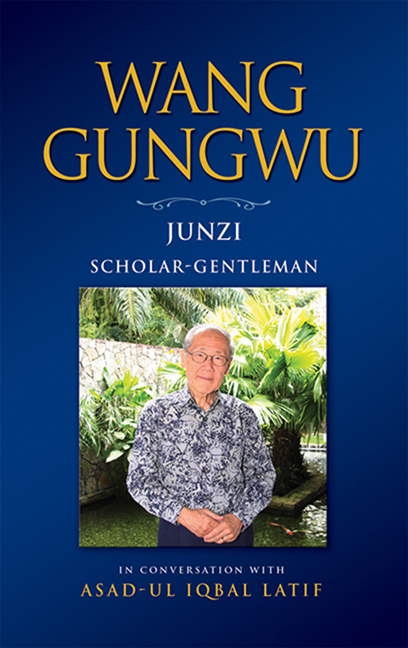Book contents
- Frontmatter
- Contents
- Foreword
- Wang Gungwu: Friend, Mentor and Role Model
- Junzi: Scholar-Gentleman
- INTERVIEWS WITH PROFESSOR WANG GUNGWU
- Being Chinese in Malaya
- Malaysia, Singapore and Australia
- Vietnam
- Hong Kong
- China Rising
- Taiwan, Japan and India
- The United States, Terrorism and War
- Half a Century of Marriage: An Interview with Mrs Margaret Wang
- Appendices
- Index
- Plate Section
Hong Kong
from INTERVIEWS WITH PROFESSOR WANG GUNGWU
Published online by Cambridge University Press: 09 November 2017
- Frontmatter
- Contents
- Foreword
- Wang Gungwu: Friend, Mentor and Role Model
- Junzi: Scholar-Gentleman
- INTERVIEWS WITH PROFESSOR WANG GUNGWU
- Being Chinese in Malaya
- Malaysia, Singapore and Australia
- Vietnam
- Hong Kong
- China Rising
- Taiwan, Japan and India
- The United States, Terrorism and War
- Half a Century of Marriage: An Interview with Mrs Margaret Wang
- Appendices
- Index
- Plate Section
Summary
You were Vice-Chancellor of the University of Hong Kong from 1986 to 1995, crucial years leading up to the British colony's return to China. Did you accept the offer to be Vice-Chancellor partly because you wanted to have a ringside view of history?
Well, I don't think I thought in terms of having a ringside view. Indeed, I never expected to be a Vice-Chancellor. I never aspired to the job, but when the invitation came, I had to think about why I would want to go. I was not particularly attracted to the idea of being a Vice-Chancellor but I was attracted to the idea of being in Hong Kong while something so important was taking place. Coming from a former British colony, I was naturally conscious of the fact that this was the last major colony of the British but, at the same time, I was also aware that this was a very different kind of colony.
Indeed, it was customary before 1997 to refer to Hong Kong as a “territory” instead of a “colony”.
Hong Kong has never been accepted as a colony by the Chinese government. The Chinese always regarded Hong Kong as a territory that was taken from them by force. At least since the revolutionary government and even before that, I think, they never thought of it as something permanent. And the idea that Hong Kong should be permanently separated from China was not acceptable to Chinese leaders. They had lost Hong Kong in war and they would like to get it back one day. Thus, how they would get it back, how the British would decolonize in this particular case, was of considerable interest to me.
The British knew, of course, that the Chinese never regarded Hong Kong as a colony. One of the reasons why the Chinese did not want Hong Kong to be considered a colony was that the decolonization committee of the United Nations took it for granted that decolonization meant the eventual independence of that colony.
- Type
- Chapter
- Information
- Wang GungwuJunzi: Scholar-Gentleman in Conversation with Asad-ul Iqbal Latif, pp. 59 - 75Publisher: ISEAS–Yusof Ishak InstitutePrint publication year: 2010

